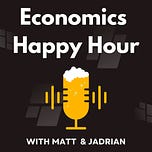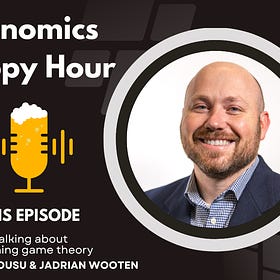Matt and Jadrian are joined by Wayne Geerling, a Professor of Instruction at the University of Texas in Austin. They discuss their experiences at the JET SET Conference and the importance of the social aspect of conferences. Wayne shares his insights on teaching in Australia versus the United States, highlighting the differences in resources and campus culture. They also talk a bit about teaching game theory, its practical applications, and the role of economic history in teaching.
Key Takeaways
Conferences provide opportunities for networking, creating connections, and having fun.
Teaching in the United States is often better resourced and allows for more freedom than in Australia.
Game theory is a fascinating topic that students enjoy and can see the practical applications of in the real world.
Understanding economic history is important in recognizing the pendulum swings of economic thought and avoiding repeating past mistakes.
Pop culture clips can be engaging and effective teaching tools, especially when they are relatable and have no language barriers.
Catch up on some old episodes:
You can also listen to us on Google Podcasts, TuneIn Radio, and Apple Podcasts. If one of these is your go-to podcast service, be sure to rate us and subscribe!
Watch this episode on YouTube:
Some show notes:
It may seem like we’ve been at conferences all summer, but we've only attended two. We’ve just had the pleasure of meeting many inspiring educators along the way. This week’s episode comes to you from the hotel bar at JET SET 2024 in Blacksburg, Virginia. We had the chance to sit down with Wayne Geerling to discuss his unique experiences teaching both in the United States and Australia. With limited beer options at the bar, we all chose a Vienna Lager from Devil’s Backbone Brewing Company, brewed just up the road in Lexington, Virginia.
Wayne Geerling is a Professor of Instruction at the University of Texas at Austin, recognized in the Economics Education community for his distinctive Aussie accent and mohawk. He first arrived in the United States in 2012 to teach economics at Penn State. It was at a conference in 2014 that Jadrian learned about Penn State's job opening from Wayne, leading to Jadrian’s first position out of graduate school. Before his move to the U.S., Wayne spent over a decade teaching at La Trobe University in Melbourne, Australia. Those 20+ years have resulted in a lot of insights about the difference between studying in the two countries.
Long-time listeners know that Matt and Jadrian love teaching game theory, and it turns out Wayne shares that enthusiasm. Game theory often marks the first time students see how economics connects to real-world strategic behavior. Students appreciate the engaging concepts and memorable video clips that illustrate these ideas. From the Joker's social experiment in The Dark Knight to the intriguing episode of Golden Balls, these clips make the lessons unforgettable.
Wayne has also worked with Dirk Mateer on a project using scenes from Crazy Rich Asians to teach game theory and co-authored a paper with Jadrian and some others that explores using scenes from Squid Game for the same purpose. There are a lot of great pop culture references that instructors can use in their classrooms that reference some popular tv shows and movies.
#14: Why is Game Theory Awesome?
In this episode, Matt was curious about Jadrian’s favorite topic to teach. The two have already covered Matt’s favorite topic in a previous episode, which means it’s Jadrian’s turn to share. Even though he knew this question would come eventually, he wasn’t ready to pick a single topic. It turns out that once he settled on game theory, it was easy for t…
Wayne was originally trained in graduate school to study history, but his fascination with economic examples led him to economics. While Wayne has become an expert in this field, he also has a strong background in Economic History. Although Matt, Jadrian, and Wayne all share a passion for history, they primarily teach principles of microeconomics, which often focuses on contemporary issues. Despite this, many historical examples could enrich microeconomics lessons. Typically, students encounter the intersection of history and economics more frequently in their macroeconomics courses.
This week’s pop culture references:
Since Wayne highlighted Golden Balls as one of his favorite scenes for teaching game theory, Jadrian shared his favorite episode from the show, featuring Nick and Mohammed. This episode showcases a clever strategy to induce cooperation, ensuring that both contestants leave with the jackpot.
Matt shifted his focus to economic history for his pop culture contribution. He’s been working on a Game of Thrones series that explores how various scenes and stories relate to economic concepts. His latest episode looks at economic growth and the Malthusian trap. Despite hundreds of years of history in Westeros and the Seven Kingdoms, there’s been no economic advancement, which contrasts sharply with the economic progress seen in most real-world countries.
Wayne almost revealed his favorite clip during the episode, but we had him save it for the end. His top pick for the principles course is the hula hoop scene from The Hudsucker Proxy. This clip effectively demonstrates key economic concepts, including supply and demand shifts, all without any dialogue. Viewers can quickly grasp how higher supply leads to lower prices and increased demand results in higher prices.
Thanks for listening!

















Share this post